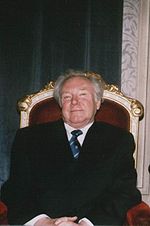Alan Watson (legal scholar), Date of Birth, Place of Birth, Date of Death
TweetAlan Watson (legal scholar)
historian and legal scholar
 Date of Birth: 27-Oct-1933
Date of Birth: 27-Oct-1933
 Place of Birth: Hamilton, Scotland, United Kingdom
Place of Birth: Hamilton, Scotland, United Kingdom
Date of Death: 07-Nov-2018
Profession: historian
Nationality: United Kingdom
Zodiac Sign: Scorpio 
About Alan Watson (legal scholar)
- W.
- Alan J.
- Watson (1933 – 7 November 2018) was a Scottish legal historian, regarded as one of the world's foremost authorities on Roman law, comparative law, legal history, and law and religion.
- He is credited for coining the term "legal transplants". Watson was educated at St John's Grammar school and at the Hamilton Academy, subsequently attending the Glasgow University, graduating in Arts in 1954 and in Law in 1957.
- He began his professional academic career at Oxford University, before taking the Douglas Chair in Civil Law at the School of Law of his alma mater, the University of Glasgow.
- He later served as Distinguished Research Professor and held the Ernest P.
- Rogers Chair at the University of Georgia School of Law.
- He was also Visiting Professor at the Edinburgh University School of Law, where he held the Chair in Civil Law from 1968 until 1981. Watson regularly served as a distinguished lecturer at leading universities in the United States and such countries as Italy, Holland, Germany, France, Poland, South Africa, Israel and Serbia.
- He attended several sessions regarding the development of a common law for the EU, including one in Maastricht in 2000, and, at the request of the U.S.
- Agency for International Development (USAID), served as a member of the two-person U.S.
- team helping to revise the draft civil code for the new Republic of Armenia. He was an honorary member of the Speculative Society and served as North American secretary of the Stair Society.
- He was an editorial board member of a number of learned journals. In 2005, the University of Belgrade's Law School established the Alan Watson Foundation in honour of his worldwide scholarship. Watson was honoured by his international colleagues in 2000-01 when two collections of essays were presented in his honour: an American volume, Lex et Romanitas: Essays for Alan Watson, and the European volume, Critical Studies in Ancient Law, Comparative Law and Legal History.
Read more at Wikipedia

